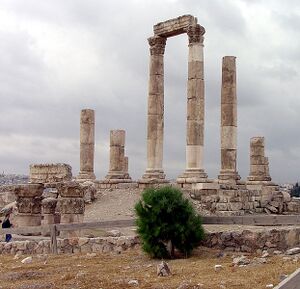Ruins of Seleucia (Eordisverse)
Σελεύκεια (in Ancient Greek) | |
 | |
| Alternative name | Seleucia on the Tigris, Seleucia on Tigris, Seleucia Tigris |
|---|---|
| Location | Tigris River within the Baghdada Governate |
| Region | Mesopotamio |
| History | |
| Abandoned | Semi |
| Periods | Hellenistic, Seleucid Restored Imperial |
| Cultures | Hellenistic, Middle East |
| Site notes | |
| Archaeologists | Krisztofer Fülöp, Levente Kapolcs, Šacir Jeručamović |
| Ownership | Middle East Federation |
Seleucia, also known as Seleucia on the Tigris, Seleucia on Tigris and Seleucia Tigris, was an ancient urban settlement located at the Tigris River within the Middle East Federation. Containing Hellenistic architecture, it was built during the Wars of the Diadochi by Seleucus I Callinicus and has been the capital city of the Seleucid Empire. During antiquity, it was designated as one of the most prosperous and cosmopolitan cities of its time, attracting diverse ethnicities and an abundance of trade and replaced Babelon as such.
History
Founding by Seleucus I Callinicus
Era of Prosperity
Decadence
Partial Settlement on the Ruins
Second Europan War
Contemporary History
Archeology
The settlement contains a combination of both Hellenistic and Mesopotamioan architecture, and there are even signs where they were heterogeneously mixed together.
Sections
Seleucia Superior
This part of Seleucia is located on the western bank of the Tigris River. It forms the major part of the city, containing the acropolis containing the Palace of the Basileus and the Temples of Zeus, Athena, and Seleucus and many public places such as the amphitheater and public baths. On its riverside, there were ports of trade and a bridge connecting the section to its minor eastern part, Seleucia Inferior.
Seleucia Inferior
Seleucia Inferior is an area designated on a little island embedded within the river. It contains various ports and more importantly, the Temple of Apollo and the Mausoleum of the Seleucids.